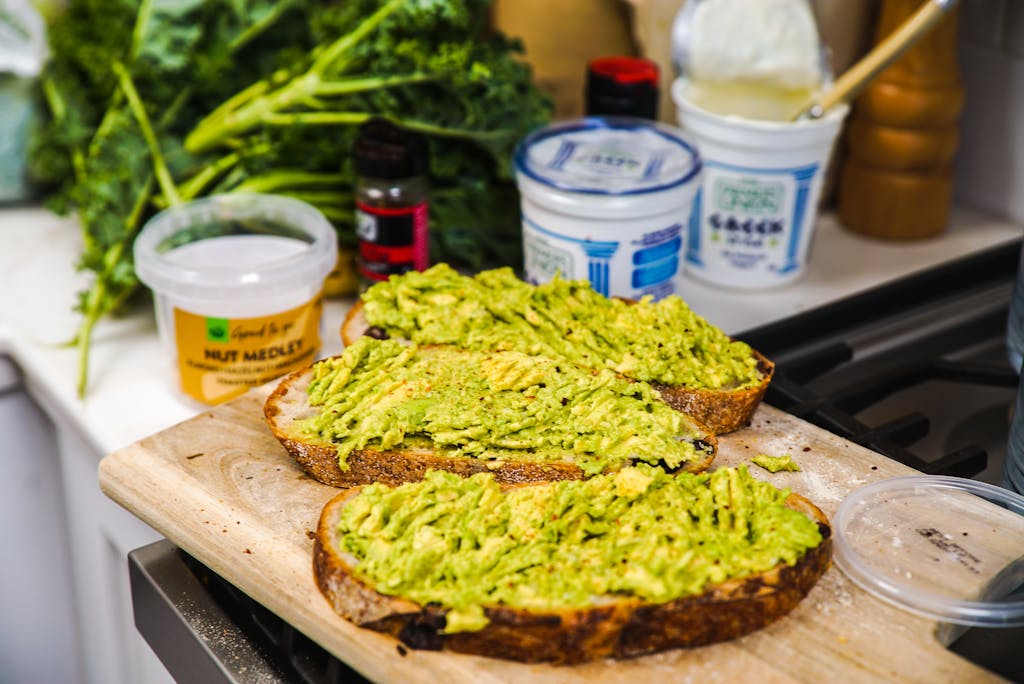FREE SHIPPING OVER $50
Want Better Sleep and Faster Fat Burn? Here’s the Exact Time to Eat Avocado

We’ve all heard that avocados are a superfood—a creamy, delicious source of healthy fats, fiber, and essential nutrients. But when it comes to maximizing their incredible benefits, simply tossing them onto your lunchtime salad might mean you’re missing out on their true potential. If your goals include winding down faster, achieving deeper sleep, and even leveraging your downtime for faster fat burn, the timing of this green fruit is far more important than you realize.
The science of nutrition timing shows that eating avocado at a specific point in your day can unlock a powerful domino effect: it manages nighttime hunger, delivers critical sleep minerals, and optimizes the hormonal balance needed for nighttime repair and metabolism. Forget the myth that eating fat late will automatically lead to weight gain. We are going to reveal the exact time to eat avocado to achieve that sought-after combination of better sleep and faster fat burn.
The Secret Window: Why Dinner or Evening is Optimal
The traditional belief is that you should eat your largest meal or most calorie-dense food, like avocado, earlier in the day to give your body time to burn the calories. While this strategy works for some, dietitians increasingly recommend shifting healthy fats and fiber, like those found in avocado, toward your evening meal or late afternoon snack to gain the maximum benefit for both sleep and fat burn.
The Exact Time: 2 to 3 Hours Before Bed
The best time to consume avocado for dual sleep and fat burn benefits is generally with your dinner or as a substantial snack 2 to 3 hours before bed.
- The Goal: This timing allows the unique components of the avocado to begin their slow digestive process, providing sustained satiety throughout the night while delivering nutrients that support the onset of sleep.
Pillar 1: How Avocado Promotes Deeper Sleep
Avocado is packed with two crucial components that directly influence the quality and depth of your nighttime rest.
Magnesium: The Relaxation Mineral
Avocados are an excellent source of magnesium, a mineral known as nature’s tranquilizer.
- The Mechanism: Magnesium helps regulate neurotransmitters that send signals throughout the brain and nervous system. It binds to GABA receptors, which calms the nervous system and prepares the body for sleep. A magnesium deficiency is strongly linked to insomnia and restless sleep. By consuming avocado in the evening, you ensure a fresh supply of magnesium is available as your body winds down.
Fiber and Satiety: Banning the Midnight Snack
One of the biggest interrupters of sleep is a sudden spike in hunger or a blood sugar dip that wakes you up. Avocado tackles this with its high fiber and monounsaturated fat content.
- The Mechanism: The combination of soluble and insoluble fiber, paired with slow-digesting fats, provides unparalleled satiety. When your meal is rich in these components, your stomach feels full longer, preventing the late-night hunger pangs that sabotage sleep and lead to extra calories consumed right before bed.
Pillar 2: Leveraging Evening Fat Burn
The idea of “burning fat while you sleep” isn’t a fantasy; it’s science. Nighttime is a crucial repair period, and when the body is not distracted by high blood sugar levels, it can prioritize fat metabolism and recovery.
Sustained Energy for Repair
The monounsaturated fats (mostly oleic acid) in avocado provide a slow, steady stream of energy.
- The Mechanism: Unlike carbohydrates, which cause a rapid spike and crash in glucose (and insulin), healthy fats barely affect blood sugar levels. When you eat avocado for dinner, your blood sugar remains stable throughout the night. This stability means your body is less likely to secrete insulin, which is a fat storage hormone. With insulin levels low, your body’s natural nighttime fat-burning processes are optimized.
Improved Hormone Balance (Cortisol and Growth Hormone)
High-quality sleep is essential for resetting your hormonal balance, which is key to fat burn.
- The Mechanism: Deep sleep is when your body releases its largest pulse of Growth Hormone (GH). GH is lipolytic, meaning it helps break down fat cells for energy and also supports muscle repair. Simultaneously, good sleep helps regulate cortisol (the stress hormone). High evening cortisol promotes fat storage, particularly around the midsection. By ensuring deep, uninterrupted rest, avocado helps keep cortisol low and GH high, promoting an ideal environment for overnight fat metabolism.
The Strategic Avocado Meal Plan
To maximize these dual benefits, you need to be strategic about what you pair your avocado with during your evening meal.
Dos and Don’ts for Evening Avocado
| Action | Why It Works for Sleep and Fat Burn |
| DO Pair it with Lean Protein | Protein increases satiety and provides amino acids for muscle repair during the night, further supporting metabolism. (e.g., chicken, fish, beans). |
| DO Add Non-Starchy Vegetables | Vegetables like spinach or broccoli add fiber without raising blood sugar, maintaining the stable glucose environment needed for fat burn. |
| DON’T Pair it with Simple Carbs | Large servings of white rice, pasta, or bread will spike insulin, negating the fat-burning benefit of the avocado by promoting fat storage. |
| DON’T Eat an Entire Avocado Alone | Even healthy fat is calorie-dense. Stick to a portion of about one-third to one-half of a large avocado to maintain caloric balance. |
Additional Health Benefits of Evening Avocado
The decision to eat avocado in the evening extends its benefits beyond sleep and fat burn.
Nutrient Absorption of Fat-Soluble Vitamins
Avocados are essential for absorbing fat-soluble vitamins (Vitamins A, D, E, and K).
- The Advantage: If your dinner contains these vitamins (e.g., Vitamin K in leafy greens, Vitamin E in nuts), the healthy fats in the avocado act as a catalyst, ensuring your body can utilize these nutrients for immune function and overall health during its primary repair phase.
Inflammation Control
Monounsaturated fats and the antioxidants in avocado possess powerful anti-inflammatory properties.
- The Advantage: Inflammation inhibits metabolic health and disrupts sleep. By consuming these fats in the evening, you help soothe systemic inflammation throughout the night, aiding in cellular repair and setting the stage for better energy the next day.
Conclusion
If you want better sleep and faster fat burn, the exact time to eat avocado is strategically positioned 2 to 3 hours before bed as part of a protein and fiber-rich dinner. This simple timing hack leverages the fruit’s rich magnesium content to calm your nervous system for deeper sleep, while its satisfying healthy fats ensure stable blood sugar throughout the night. By keeping insulin low and hormone balance optimized, you create the ideal internal environment for fat metabolism and maximum overnight recovery, making your nightly rest a powerful tool for health and weight management.
Related Articles
- Stop Fearing Fruit: 5 Science-Backed Reasons Diabetics Can Eat It Daily Without Spiking Blood Sugar
- Struggling With Blood Sugar? These 5 Whole Grains Help Reverse Insulin Resistance Naturally
- Over 50? These 10 ‘Healthy’ Breakfast Foods Are Quietly Spiking Your Blood Sugar
- Tired Eyes? These 14 Foods Fight Eye Strain and Protect Your Vision—Backed by a Dietitian
- Feeling Low? These 15 Foods Act Like Natural Antidepressants, Say Psychologists







